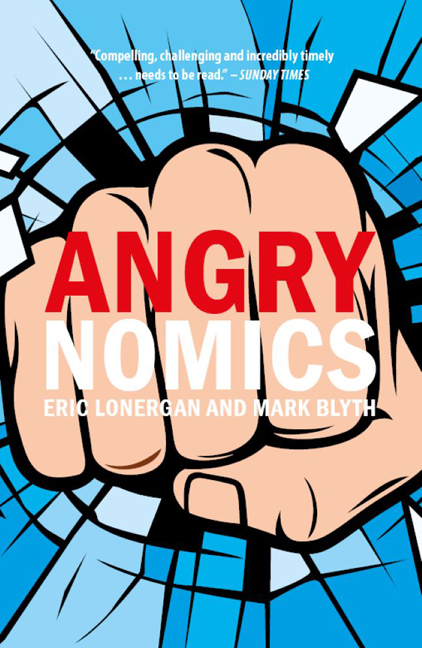Book contents
- Frontmatter
- Contents
- Dedication
- Acknowledgements
- Introduction: from economics to angrynomics
- Dialogue 1 Public anger and the energy of tribes
- Dialogue 2 The moral mobs and their handlers
- Dialogue 3 Macroangrynomics: capitalism as hardware
- Dialogue 4 Microangrynomics: private stressors, uncertainty and risk
- Dialogue 5 Calming the anger: from angrynomics to an economics that works for everyone
- Conclusions
- Postscript: angrynomics in a pandemic
- Further reading
- Notes
- Index
Conclusions
Published online by Cambridge University Press: 20 December 2023
- Frontmatter
- Contents
- Dedication
- Acknowledgements
- Introduction: from economics to angrynomics
- Dialogue 1 Public anger and the energy of tribes
- Dialogue 2 The moral mobs and their handlers
- Dialogue 3 Macroangrynomics: capitalism as hardware
- Dialogue 4 Microangrynomics: private stressors, uncertainty and risk
- Dialogue 5 Calming the anger: from angrynomics to an economics that works for everyone
- Conclusions
- Postscript: angrynomics in a pandemic
- Further reading
- Notes
- Index
Summary
We hope that these dialogues have been a useful and fun way to engage with these ideas. To make sure we are all on the same page as we leave the page, we now want to summarize the core arguments that we have made and also to acknowledge what we are not saying.
Our ambition in Angrynomics has been to provide a primer on why the world is the way it is today. We also wanted to do that in a way that neither patronises nor expects the reader to trudge through a scholarly treatise. We also wanted to keep it short. That has costs. Some people may find our analysis partial and our proposals underdeveloped. If so, they have misunderstood the point of the book. Our aim has been to introduce these ideas, not to seek to prove them or make the case that nothing else matters.
For example, we both agree climate change is the most important challenge facing humanity. Indeed, from that perspective what we are writing about is trivia. But we think our decision not to start and end with climate change as the defining issue of the moment is justified on the following grounds. If you don't first do something about the anger, about restoring “economics” over angrynomics, then you can forget about ever getting serious policies to address climate change. We will never get them off the drawing board for fighting among ourselves, while allowing our tribal instincts to obscure our judgements.
Similarly, some may think we give short shrift to cultural explanations of these same phenomena, and indeed we do. But we do so because our framework allows us to do something about the underlying causes of angrynomics. Starting and ending with culture does nothing. It's a counsel of despair. Once you have decided that half your country is made up of people who are entirely different from you, and therefore wrong, it can only end badly. We need to aim higher than castigation and moral superiority as ends in and of themselves.
- Type
- Chapter
- Information
- Angrynomics , pp. 159 - 162Publisher: Agenda PublishingPrint publication year: 2020



